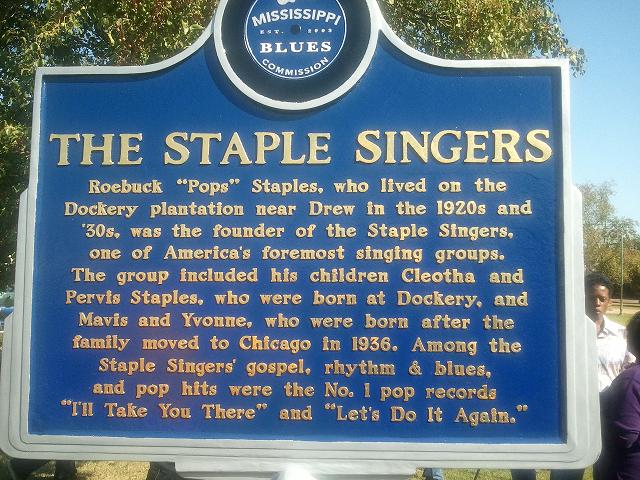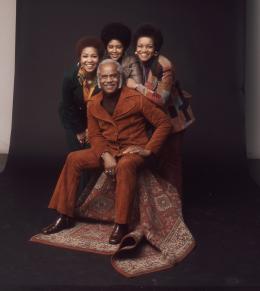
DREW – On Wednesday, the Mississippi Blues Trail unveiled a marker to honor a family whose music is known around the world. They’re one of the few groups in the music industry to achieve superstardom on at least three different levels – gospel, blues and R&B – and many of their songs have become anthems within the black community. And still, nearly 40 years later, they continue to hold a place of endearment in the hearts of their adoring fans.
The marker, honoring the legendary Staple Singers, was unveiled on North Main Street. in Drew, noting the location where the patriarch of the group, Pops, lived during the 1920s and 30s.
Among the Staple Singers’ biggest hits were: “I’ll Take You There,” “Let’s Do It Again” and “Respect Yourself.”
Roebuck “Pops” Staples was born in Montgomery County, Miss., in 1914, and later moved with his parents and siblings to Will Dockery’s plantation near Drew. Drew, Mississippi, at that time, was an important breeding ground for the Delta blues.
Young Pops and his siblings were inspired to take up guitar by local blues artists Charley Patton, Howlin’ Wolf, Dick Bankston, and Jim Holloway, and they were soon performing as a group at local juke joints.
By the age of 15, Pops was singing with gospel groups and continued to do so after moving to Chicago, where he formed the Staple Singers in 1948.
The group included his children Cleotha and Pervis Staples, who were born at Dockery, and Mavis and Yvonne, who were born after the family moved to Chicago in 1936. As a group, they first recorded for Pops’ own Royal label in 1953 and they went on to become one of America’s foremost singing groups.
The Staple Singers, who brought messages of love, hope, and peace to audiences for half a century, built their distinctive sound on gospel and blues traditions from the Drew area.
The group gained national attention with the 1956 hit “Uncloudy Day” on the Vee-Jay label, and in the early ‘60s were refashioned as a “folk gospel” group.
They became active participants in the Civil Rights movement, recording anthems including “Freedom Highway” and “Why (Am I Treated So Bad),” a favorite of their close friend, Dr. Martin Luther King Jr.
In 1968, the Staples signed with Stax Records, where they had numerous hits with positive message songs including “I’ll Take You There” and “Respect Yourself.” Pervis left the group to pursue artist management and song publishing and was replaced by sister Yvonne. The group’s last major hit was the Curtis Mayfield-penned “Let’s Do It Again” (1975).
Both Mavis and Pops later had successful solo careers.
Pops, who died on Dec. 19, 2000, was honored with his own marker on the Mississippi Blues Trail in Winona on Dec. 16, 2010.
“I’m glad we can honor the Staples family with a marker on the Mississippi Blues Trail,” Gov. Haley Barbour said. “The influence of Pops and his children can be heard today in gospel, folk, blues and pop music. They are great examples of why Mississippi is the ‘Birthplace of America’s Music.'”
Other artists who lived in the Drew area during the post-World War II era include guitarist Boyd Gilmore (c. 1910-1976), whose early ‘50s recordings for Modern featured Ike Turner on piano and included covers of Robert Johnson songs. Gilmore also recorded for Sun and later moved to California.
Drummer Kansas City Red (Arthur Lee Stevenson, 1926-1991) played with Robert Nighthawk before moving to Chicago, where he led bands and ran nightclubs. Singer James Kinds, born near Drew in 1943, began singing blues at one of Red’s clubs and later recorded several albums in Dubuque, Iowa, and Chicago.
Local fiddler Sylvester Davis founded the Lard Can Band, which included his children James (“Boo Boo”) on drums, John on guitar, Sylvester Jr. on bass and Clara on vocals. The siblings also played with local bluesman “T-Bone Walker” Joe Louis in the ’50s and later performed together in East St. Louis as the Davis Brothers Blues Band.
Vocalist-pianist Homer Harris (1916-2000) is best known because Muddy Waters appeared on his lone 1946 session for Columbia in Chicago, while Charles “Guitar” Friday (1934-2003), a veteran of the Memphis blues scene, recorded a 1966 single for Excello, and schoolteacher-keyboardist Jesse Gresham (b. 1947) recorded for the Jewel label in 1971 before becoming a pastor in Drew.


Be the first to comment